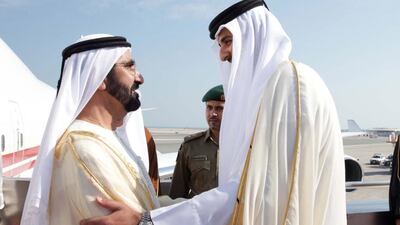This week's GCC summit, which presented a united front in the face of unprecedented security challenges, was a far cry from the dramatic events of just nine months ago. Then, the UAE, Saudi Arabia and Bahrain had withdrawn their ambassadors from Doha as a gesture of protest against Qatar's support for the Muslim Brotherhood.
But now, there is unity – and amity – once again. That is the real deal, not the announcement of the creation of a unified police force and a joint navy, or the exploration of greater military integration. All of these are triggered by direct self-interest in the face of shared security threats. They augment the provisions of Peninsula Shield, the existing GCC security allianc
The real significance of this summit has to be the growing maturity of the GCC alliance. We have tacitly acknowledged that we can have significant differences on important topics and yet find a way to reach an acceptable compromise and unite on the issues that really matter.
The once-fractious issue of the Muslim Brotherhood is a good example. Qatar has long had close ties with it, while the UAE, Saudi Arabia and Bahrain have been strongly opposed to its goals and tactics. Last year's sedition trial in the UAE showed that the Brotherhood had recruited people with the aim of turning them against the state. No government could – or should – tolerate that.
The clash of regional views about the Brotherhood matters when it comes to places like Egypt, which most of the GCC countries have been trying to help emerge from the chaotic years since the 2011 uprising. Doha had continued to support Mohammed Morsi, the Muslim Brotherhood president who was ousted last year, and the UAE and others have championed Abdel Fattah El Sisi, his elected replacement. But at the summit, the GCC came together on this issue and explicitly backed Mr El Sisi’s presidency.
This does not mean there will never again be disagreements between the Gulf countries. And there is difficult work still to be done on maximising the alliance’s defence capabilities, not least surmounting the logistical challenges of creating a unified command and control mechanism across all six countries. But the fine art of compromise will come in handy when addressing these and other challenges.

